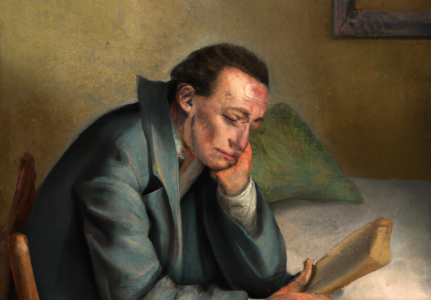Unlocking the Enigma of Camus’ Masterpiece
Albert Camus‘ “The Stranger” stands as an enduring testament to the complexities of human existence, blending a gripping narrative with profound philosophical musings. Published in 1942, this novella has continued to captivate readers and stimulate discussions about the meaning of life, the absurdity of existence, and the consequences of detached indifference. In this comprehensive exploration, we delve into the plot, key characters, and central themes of “The Stranger,” uncovering its origins, its impact on literature and culture, and offering suggestions for further reading.
Plot: A Tale of Absurdity
“The Stranger” opens with a stark declaration: “Mother died today. Or maybe, yesterday; I can’t be sure.” These first lines introduce us to Meursault, the novel’s enigmatic protagonist, who approaches life with a disturbingly detached demeanor. The story unfolds in the scorching backdrop of French Algeria, as Meursault navigates the mundane routines of his life with dispassionate apathy.
Meursault’s indifference becomes evident as he attends his mother’s funeral without displaying any conventional signs of grief. He prefers the sensory pleasures of life, such as smoking, drinking, and casual relationships, over emotional engagement. His detached perspective on existence is encapsulated in his response to life’s most pressing questions: “It doesn’t matter.”
The plot takes a dark turn when Meursault commits an inexplicable act of violence on a sun-drenched beach, killing an Arab man. The subsequent trial and its absurdity, driven by societal expectations and moral judgments, serve as a lens through which Camus examines the human condition. Meursault’s trial, rather than being a quest for justice, reveals the absurdity of the human pursuit of meaning and the consequences of deviating from societal norms.
Key Characters: Unmasking the Players
Meursault
Meursault is the central figure of “The Stranger.” His lack of emotional depth, penchant for routine, and casual amorality set the stage for the novel’s exploration of existential themes. He represents the disengaged, detached individual, living life on the surface, and offering no rational explanations for his actions.
Marie Cardona
Marie, Meursault’s girlfriend, serves as a foil to his detached nature. She represents a desire for emotional connection and normalcy, which starkly contrasts with Meursault’s indifference.
Raymond Sintes
Raymond, Meursault’s neighbor and friend, embodies the destructive consequences of unchecked impulses. His violent relationship with his Arab girlfriend serves as a precursor to Meursault’s own act of violence.
The Chaplain
The prison chaplain symbolizes the conflict between Meursault’s atheism and society’s religious expectations. Their exchanges in prison delve into the nature of belief, the absence of meaning, and the absurdity of existence.
Key Themes: Unveiling the Existential Depths
Existential Absurdity
At the heart of “The Stranger” lies the theme of existential absurdity. Camus illustrates that life is inherently meaningless, and any attempt to impose meaning upon it is futile. Meursault’s indifference to societal norms and moral judgments highlights the absurdity of human existence.
Alienation and Isolation
Meursault’s alienation from society is a recurring motif. His inability to connect emotionally with others leaves him isolated and detached. This theme mirrors the broader existentialist concern with the inherent isolation of the individual.
The Banality of Evil
Camus explores the idea that evil actions can arise from ordinary circumstances. Meursault’s murder of the Arab man is not premeditated; it emerges from a chain of thoughtless decisions, highlighting the potential for evil within the mundane.
Freedom and Responsibility
Meursault’s insistence on his own freedom and autonomy, even in the face of societal condemnation, raises questions about the relationship between freedom and responsibility. He refuses to conform to society’s expectations, asserting his right to live life on his terms.
What Inspired the Book: Camus’ Philosophical Journey
To understand “The Stranger” fully, it’s essential to delve into the intellectual and philosophical background that influenced Albert Camus. Born in 1913 in French Algeria, Camus was deeply affected by the political and philosophical currents of his time.
Camus’ philosophy is rooted in existentialism, a school of thought that gained prominence in the mid-20th century. Existentialists grappled with the idea that life lacks inherent meaning and that individuals must create their own purpose in a seemingly indifferent universe. Prominent existentialists like Jean-Paul Sartre and Simone de Beauvoir explored similar themes, but Camus brought his unique perspective to the table.
Camus’ experiences as a pied-noir (a French citizen born in Algeria) and his early years in poverty profoundly shaped his worldview. His firsthand exposure to the harsh realities of colonialism and class disparity in Algeria fueled his interest in social justice and the absurdity of the human condition.
“The Stranger” emerged as a product of Camus’ philosophical evolution. He famously articulated his philosophy of the absurd in his essay “The Myth of Sisyphus,” published in 1942, the same year as “The Stranger.” In this essay, Camus posits that life’s inherent lack of meaning does not necessitate despair but should instead lead to a revolt against the absurdity of existence.
Camus’ exploration of these philosophical ideas found its most vivid expression in the character of Meursault and the events of “The Stranger.” The novella can be seen as an embodiment of Camus’ existentialist and absurdist philosophy, providing a narrative framework to examine the human condition.
Reviews and Cultural Impact: A Literary Phenomenon
Controversial Reception
Upon its publication, “The Stranger” elicited a range of reactions. Many critics and readers were initially taken aback by the novel’s unconventional narrative style and Meursault’s morally ambiguous character. Some dismissed it as nihilistic and amoral, while others saw it as a profound exploration of existential themes.
Critical Acclaim
Over time, “The Stranger” garnered critical acclaim and achieved literary recognition. Jean-Paul Sartre, a fellow existentialist philosopher, praised the novel as a significant contribution to existential literature. Sartre’s analysis of the book in his essay “Explication de L’Étranger” helped solidify its status as a philosophical masterpiece.
Cultural Impact
“The Stranger” has left an indelible mark on literature and popular culture. It remains a staple in literature courses worldwide and continues to spark discussions about existentialism, morality, and the human condition. Its influence can be seen in works by contemporary authors who explore similar themes of alienation and existential angst.
Translations and Adaptations
The novel’s impact has extended beyond the written page. It has been translated into numerous languages, allowing a global audience to engage with its themes. Additionally, “The Stranger” has inspired several adaptations, including stage plays, films, and even a graphic novel. These adaptations have brought Camus’ story to new audiences and provided fresh perspectives on its enduring relevance.
Examples of Similar Books: Exploring Existentialism
If you found “The Stranger” thought-provoking and are eager to delve deeper into the realm of existentialism, there are several other literary works that explore similar themes and philosophical ideas. Here are a few recommendations:
1. “Nausea” by Jean-Paul Sartre
Jean-Paul Sartre’s “Nausea” is a foundational text of existentialism. The novel follows Antoine Roquentin, a solitary writer who grapples with the overwhelming sense of nausea and existential dread in his mundane existence. Sartre’s exploration of the absurdity of life and the search for meaning resonates deeply with the themes in “The Stranger.”
2. “The Plague” by Albert Camus
Another masterpiece by Camus, “The Plague” explores the human response to a devastating epidemic in a small Algerian town. As the town is quarantined, its residents must confront the absurdity of suffering and death. The novel delves into themes of solidarity, morality, and the human capacity for heroism in the face of the absurd.
3. “The Metamorphosis” by Franz Kafka
Franz Kafka’s “The Metamorphosis” tells the surreal story of Gregor Samsa, who wakes up one day to find himself transformed into a giant insect. This novella explores themes of alienation, absurdity, and the dehumanizing effects of modern life, echoing the existential concerns central to “The Stranger.”
4. “Notes from Underground” by Fyodor Dostoevsky
Although predating existentialism as a formal philosophy, Dostoevsky’s “Notes from Underground” delves into the psyche of its unnamed narrator, who grapples with nihilism and the meaninglessness of life. The novel’s exploration of human suffering and the desire for self-destruction aligns with existentialist themes.
Other Books by Albert Camus: A Literary Journey
Albert Camus was a prolific writer, and his literary contributions extend beyond “The Stranger.” If you’ve been captivated by Camus’ unique perspective on the human condition, here are some of his other notable works worth exploring:
1. “The Myth of Sisyphus”
In this philosophical essay, Camus introduces his concept of the absurd and explores the idea that life lacks inherent meaning. He argues that the human response to this absurdity should be one of revolt and the embrace of individual freedom.
2. “The Fall”
“The Fall” is a novel that delves into the psychological turmoil of its protagonist, Jean-Baptiste Clamence. Through a series of monologues, Clamence reflects on his life and moral failings, providing a profound exploration of guilt, responsibility, and the human condition.
3. “Exile and the Kingdom”
This collection of short stories showcases Camus’ literary versatility. Each story explores the human experience in different settings, from North Africa to France, and delves into themes of alienation, isolation, and the search for meaning.
4. “The Rebel”
In “The Rebel,” Camus explores the idea of rebellion as a response to oppression and injustice. He critiques both the nihilism of totalitarianism and the excesses of revolution, offering a nuanced perspective on the role of rebellion in human history.
The Stranger
In conclusion, Albert Camus’ “The Stranger” remains a literary and philosophical masterpiece that challenges readers to confront the absurdity of human existence. Through its intriguing plot, memorable characters, and profound themes, the novella continues to provoke thought and inspire discussions about the nature of life, meaning, and morality. As you delve further into Camus’ body of work and explore related literature, you embark on a journey of philosophical discovery, where the search for meaning in an indifferent universe becomes both a challenge and a source of profound insight.
For further reading on existentialism, check out our articles:


